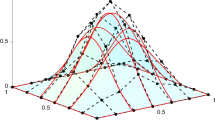Abstract
The approximation of the objective function is a well known method of speeding up optimization process, especially if the objective evaluation is costly. This is the case of inverse parametric problems formulated as global optimization ones, in which we recover partial differential equation parameters by minimizing the misfit between its measured and simulated solutions. Typically, the approximation used to build the surrogate objective is rough but globally applicable in the whole admissible domain. The authors try to carry out a different task of detailed misfit approximation in the regions of low sensitivity (plateaus). The proposed complex method consists of independent \(C^0\) Lagrange approximation of the misfit and its gradient, based on the nodes obtained during the dedicated memetic process, and the subsequent projection of the obtained components (single or both) on the space of B-splines. The resulting approximation is globally \(C^1\), which allows us to use fast gradient-based local optimization methods. Another goal attained in this way is the estimation of the shape of plateau as an appropriate level set of the approximated objective. The proposed strategy can be applied for solving ill-conditioned real world inverse problems, e.g., appearing in the oil deposit investigation. We show the results of preliminary tests of the method on two benchmarks featuring convex and non-convex U-shaped plateaus.
This work is supported by National Science Centre, Poland grant no. 2015/17/B/ST6/01867.
Similar content being viewed by others
References
Tarantola, A.: Inverse Problem Theory. Mathematics and Its Applications. Society for Industrial and Applied Mathematics, Philadelphia (2005)
Gajda-Zagórska, E., Schaefer, R., Smołka, M., Paszyński, M., Pardo, D.: A hybrid method for inversion of 3D DC logging measurements. Nat. Comput. 3, 355–374 (2014)
Smołka, M., Gajda-Zagórska, E., Schaefer, R., Paszyński, M., Pardo, D.: A hybrid method for inversion of 3D AC logging measurements. Appl. Soft Comput. 36, 422–456 (2015)
Tikhonov, A., Goncharsky, A., Stepanov, V., Yagola, A.: Numerical Methods for the Solution of Ill-Posed Problems. Kluwer, Dordrecht (1995)
Preuss, M.: Multimodal Optimization by Means of Evolutionary Algorithms. Natural Computing. Springer, Heidelberg (2015)
Schaefer, R., Adamska, K., Telega, H.: Genetic clustering in continuous landscape exploration. Eng. Appl. Artif. Intell. (EAAI) 17, 407–416 (2004)
Wolny, A., Schaefer, R.: Improving population-based algorithms with fitness deterioration. J. Telecommun. Inf. Technol. 4, 31–44 (2011)
Faliszewski, P., Sawicki, J., Schaefer, R., Smołka, M.: Multiwinner voting in genetic algorithms for solving Ill-posed global optimization problems. In: Squillero, G., Burelli, P. (eds.) EvoApplications 2016. LNCS, vol. 9597, pp. 409–424. Springer, Heidelberg (2016). doi:10.1007/978-3-319-31204-0_27
Faliszewski, P., Sawicki, J., Schaefer, R., Smołka, M.: Multiwinner voting in genetic algorithms. IEEE Intell. Syst. (2016, accepted)
Grefenstette, J., Fitzpatrick, J.: Genetic search with approximate fitness evaluations. In: Proceedings of the International Conference on Genetic Algorithms and Their Applications, pp. 112–120 (1985)
Jin, Y.: A comprehensive survey of fitness approximation in evolutionary computation. Soft. Comput. 9(1), 53–59 (2005)
Bhattachaya, M.: Evolutionary approaches to expensive optimization. Int. J. Adv. Res. Artif. Intell. 2(3), 3–12 (2013)
Brownlee, A., Woodward, J., Swan, J.: Metaheuristic design pattern: surrogate fitness functions. In: GECCO 2015 Proceedings, pp. 1261–1264. ACM Press, July 2015
Sawicki, J.: Identification of low sensitivity regions for inverse problems solutions. Master’s thesis, AGH University of Science and Technology, Faculty of Informatics, Electronics and Telecommunication, Kraków, Poland (2016)
Dierkes, T., Dorn, O., Natterer, F., Palamodov, V., Sielschott, H.: Fréchet derivatives for some bilinear inverse problems. SIAM J. Appl. Math. 62(6), 2092–2113 (2002)
Smołka, M.: Differentiability of the objective in a class of coefficient inverse problems. Comput. Math. Appl. (submitted)
Smołka, M., Schaefer, R., Paszyński, M., Pardo, D., Álvarez-Aramberri, J.: An agent-oriented hierarchic strategy for solving inverse problems. Int. J. Appl. Math. Comput. Sci. 25(3), 483–498 (2015)
Ciarlet, P.G.: The Finite Element Method for Elliptic Problems. North-Holland, New York (1978)
Folland, G.B.: Real Analysis. Pure and Applied Mathematics, 2nd edn. Wiley, New York (1999). Modern Techniques and Their Applications, A Wiley-Interscience Publication
Gao, L., Calo, V.M.: Fast isogeometric solvers for explicit dynamics. Comput. Methods Appl. Mech. Eng. 274, 19–41 (2014)
Łoś, M., Woźniak, M., Paszyński, M., Hassaan, M.A., Lenharth, A., Pingali, K.: IGA-ADS: parallel explicit dynamics GALOIS solver using isogeometric \(L^2\) projections. Comput. Phys. Commun. (submitted)
Woźniak, M., Łoś, M., Paszyński, M., Dalcin, L., Calo, V.M.: Parallel three dimensional isogeometric \(l^2\)-projection solver. Comput. Inform. (accepted)
Łoś, M., Woźniak, M., Paszyński, M., Dalcin, L., Calo, V.M.: Dynamics with matrices possesing Kronecker product structure. Procedia Comput. Sci. 51, 286–295 (2015)
Łoś, M., Paszyński, M., Kłusek, A., Dzwinel, W.: Application of fast isogeometric \(L^2\) projection solver for tumor growth simulations. Comput. Methods Appl. Mech. Eng. (submitted)
Author information
Authors and Affiliations
Corresponding author
Editor information
Editors and Affiliations
Rights and permissions
Copyright information
© 2017 Springer International Publishing AG
About this paper
Cite this paper
Łoś, M., Schaefer, R., Sawicki, J., Smołka, M. (2017). Local Misfit Approximation in Memetic Solving of Ill-Posed Inverse Problems. In: Squillero, G., Sim, K. (eds) Applications of Evolutionary Computation. EvoApplications 2017. Lecture Notes in Computer Science(), vol 10199. Springer, Cham. https://doi.org/10.1007/978-3-319-55849-3_20
Download citation
DOI: https://doi.org/10.1007/978-3-319-55849-3_20
Published:
Publisher Name: Springer, Cham
Print ISBN: 978-3-319-55848-6
Online ISBN: 978-3-319-55849-3
eBook Packages: Computer ScienceComputer Science (R0)




